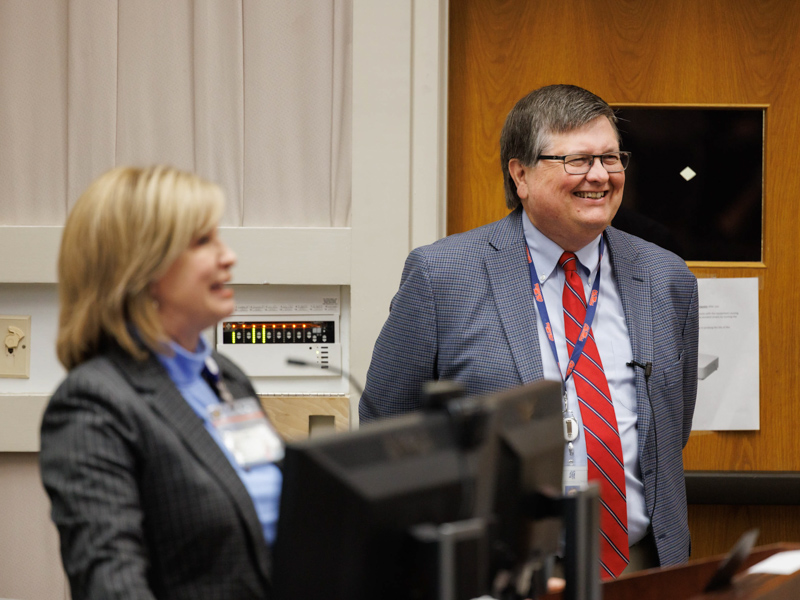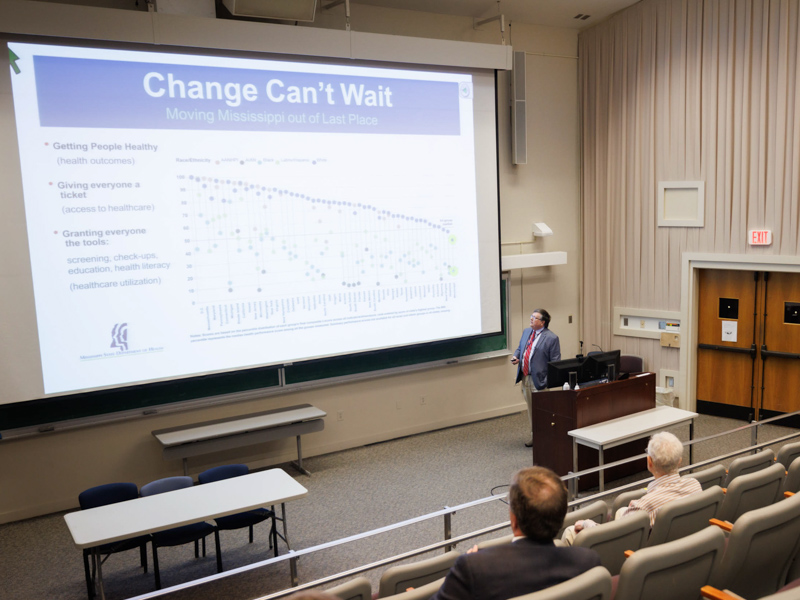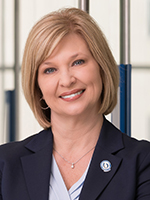Edney speaks on access to care, infant mortality in lecture

Moving Mississippi out of its all-too-familiar place in national health rankings with evidence-based practices is job one for Dr. Daniel Edney in his first year as State Health Officer.
The state was in last place among all 50 states and the District of Columbia in a multi-step study for 2022 by the nonprofit Commonwealth Fund when it comes to access to health care, health outcomes, prevalence and quality of health insurance and rate of health disparities, among additional factors. The state is among only three states, including West Virginia and Oklahoma, below the national median for health care system performance for all ethnic groups measured.
“All our demographics are coming in below the national median,” Edney said, speaking Oct. 31 as part of the Vice Chancellor’s Lecture Series. His presentation, “State of the State: A Public Health Perspective,” emphasized “moving the needle” on the state’s most prominent national rankings and summed up a general call to action to invest more public dollars in public health.

“Among our neighbors, Oklahoma is closes to us, but there’s a big drop off from 49th to 50th,” he said, noting the state is alone with a rating 10 points behind the national median. “If there were 60 states, we’d be 60th. Other states in our region are moving forward. They’re making better decisions at a systemic level with what they’re doing with health care. Our numbers are getting worse.”
Edney, of Vicksburg, became State Health Officer Aug. 1, succeeding Dr. Thomas Dobbs. He has practiced general primary care internal medicine in the River City and has worked actively in the field of addiction medicine since 2013.
Since taking the reins, the agency as a whole has eased out of COVID-19 pandemic response, he said, with the agency’s epidemiology department handling virus management. “It’s allowed me and the agency to pivot back to our core mission.”
Maternal infant and infant mortality rates in the state are tops in that mission for MDAH going forward, he said, noting significant disparities in both infant and fetal deaths in the state’s non-Hispanic Black population. Death rates in the group were more than double that of non-Hispanic Whites. “In 2022, it just does not need to be that way,” he said. “What we’ve done for the last 30 years has gotten us right here. I’m not saying what we were doing was wrong, but it’s certainly been insufficient.
“If we just keep monitoring and recording data, nothing’s going to change. If those of you in medicine don’t engage and come up with out-the-box thinking, nothing’s going to change. If you’re pregnant in the Mississippi Delta, it doesn’t matter your race or your income or your insurance status, you’re high-risk.”
Edney also addressed closures in recent years of medical facilities in Greenwood and Greenville, plus alarmingly low patient census numbers in cities across the northern half of the state, including Vicksburg. He said he hopes to see more smaller facilities merge, more outpatient facilities become established and payment models reconfigured to meet the needs of the neediest of Mississippians.
Per-capita public health funding remains low as well, he said. Recent figures by the department show $15.77 per person per year is spent on public health in Mississippi, compared to $40.99 in Louisiana, $43.08 in Arkansas and $51.03 in Alabama, which all border Mississippi.
“You invest in what you care about,” he said. “When we look at education, we can see we’ve gone from 50th to 38th,” he said. “How can we go from 50th to 38th in health? That would do so much for morbidity and mortality in our state.
“I’ve asked my friends at the Capitol we need you, we want you – but we can’t wait,” he said. “We can’t wait years for the legislative process to do its thing.”

Dr. LouAnn Woodward, vice chancellor for health affairs and dean, School of Medicine, noted Dr. Edney’s track record and UMMC’s role in assisting MDAH in its current efforts.
“His interest, care and concern for health in the state of Mississippi and the health of its citizens is not new,” Woodward said. “It has been longstanding and has a proven track record of commitment for the care of Mississippians. We very much look forward to working with you over these next few years in this new role.”


